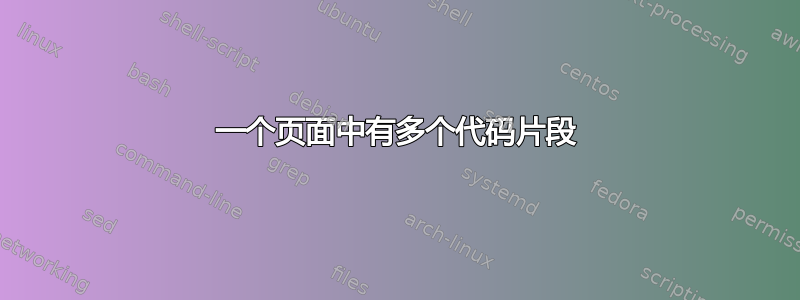
我有 3 个代码片段,我想使用 Latex 以水平方式显示它们。以便读者可以同时比较所有三个代码。
我尝试使用 minipage 和 paracolumn,但代码变得混乱。
有没有人有更好的想法来做到这一点,或者任何参考都会对我有帮助。
谢谢!
已编辑
我尝试过的代码:
\noindent\fcolorbox{black}{white}{%
\minipage[c]{\dimexpr0.30\linewidth}
\textcolor{dkgreen}{// Code 1 } \\
\textcolor{blue}{for} i:=maxint to 0 \textcolor{blue}{do} \\
\textcolor{blue}{begin} \{ \\
Sample Code 1 \} \\
\textcolor{blue}{end}; \\
\endminipage}\hfill
\fcolorbox{black}{white}{%
\minipage[c]{\dimexpr0.30\linewidth}
\textcolor{dkgreen}{// Code 2 } \\
\textcolor{blue}{for} i:=maxint to 0 \textcolor{blue}{do} \\
\textcolor{blue}{begin} \{ \\
Sample Code 2 \} \\
\textcolor{blue}{end}; \\
\endminipage}\hfill
\fcolorbox{black}{white}{%
\minipage[c]{\dimexpr0.30\linewidth}
\textcolor{dkgreen}{// Code 3 } \\
\textcolor{blue}{for} i:=maxint to 0 \textcolor{blue}{do} \\
\textcolor{blue}{begin} \{ \\
Sample Code 3 \} \\
\textcolor{blue}{end}; \\
\endminipage}
如您所见,我无法正确缩进代码。我还必须自己突出显示该语言的关键字。
答案1
使用listings-package 你可以做这样的事情(我不知道你使用哪种语言,所以我只使用了 python,lstset 取自这里):
\documentclass[]{scrartcl}
\usepackage{listings}
\usepackage{color}
%\lstset{language=Python}
\definecolor{mygreen}{rgb}{0,0.6,0}
\definecolor{mygray}{rgb}{0.5,0.5,0.5}
\definecolor{mymauve}{rgb}{0.58,0,0.82}
\lstset{ %
backgroundcolor=\color{white}, % choose the background color; you must add \usepackage{color} or \usepackage{xcolor}; should come as last argument
basicstyle=\footnotesize, % the size of the fonts that are used for the code
breakatwhitespace=false, % sets if automatic breaks should only happen at whitespace
breaklines=true, % sets automatic line breaking
captionpos=b, % sets the caption-position to bottom
commentstyle=\color{mygreen}, % comment style
deletekeywords={...}, % if you want to delete keywords from the given language
escapeinside={\%*}{*)}, % if you want to add LaTeX within your code
extendedchars=true, % lets you use non-ASCII characters; for 8-bits encodings only, does not work with UTF-8
frame=single, % adds a frame around the code
keepspaces=true, % keeps spaces in text, useful for keeping indentation of code (possibly needs columns=flexible)
keywordstyle=\color{blue}, % keyword style
language=Python, % the language of the code
morekeywords={*,...}, % if you want to add more keywords to the set
numbers=left, % where to put the line-numbers; possible values are (none, left, right)
numbersep=5pt, % how far the line-numbers are from the code
numberstyle=\tiny\color{mygray}, % the style that is used for the line-numbers
rulecolor=\color{black}, % if not set, the frame-color may be changed on line-breaks within not-black text (e.g. comments (green here))
showspaces=false, % show spaces everywhere adding particular underscores; it overrides 'showstringspaces'
showstringspaces=false, % underline spaces within strings only
showtabs=false, % show tabs within strings adding particular underscores
stepnumber=2, % the step between two line-numbers. If it's 1, each line will be numbered
stringstyle=\color{mymauve}, % string literal style
tabsize=2, % sets default tabsize to 2 spaces
title=\lstname % show the filename of files included with \lstinputlisting; also try caption instead of title
}
\begin{document}
\noindent
\begin{minipage}[t]{0.3\textwidth}
\begin{lstlisting}[frame=single]
i=0
while i < 5:
example_code1
example_code2
example_code3
i++
return
\end{lstlisting}
\end{minipage}\hfill
\begin{minipage}[t]{0.3\textwidth}
\begin{lstlisting}[frame=single]
i=0
while i < 5:
example_code
i++
return
\end{lstlisting}
\end{minipage}\hfill
\begin{minipage}[t]{0.3\textwidth}
\begin{lstlisting}[frame=single]
i=0
while i < 5:
example_code1
example_code2
i++
return
\end{lstlisting}
\end{minipage}
\end{document}
答案2
该verbatimbox包允许将代码片段保存在\hboxes 中,以便以后调用,在本例中是通过\hfilled 行调用。
\documentclass[a4paper]{article}
\usepackage[margin=1cm]{geometry}
\usepackage{verbatimbox,stackengine}
\begin{document}
\begin{myverbbox}[\scriptsize]{\codeA}
long some_function();
/* int */ other_function();
/* int */ calling_function()
{
long test1;
register /* int */ test2;
test1 = some_function();
if (test1 > 0)
test2 = 0;
else
test2 = other_function();
return test2;
}
\end{myverbbox}
\begin{myverbbox}[\scriptsize]{\codeB}
#include <stdio.h>
int main(void)
{
printf("hello, world\n");
}
\end{myverbbox}
\begin{myverbbox}[\scriptsize]{\codeC}
#include <stdio.h>
main()
{
int number;
printf("Enter an integer\n");
scanf("%d",&number);
printf("Integer entered by you is
%d\n", number);
return 0;
}
\end{myverbbox}
\noindent\belowbaseline[0pt]{\codeA}\hfill%
\belowbaseline[0pt]{\codeB}\hfill%
\belowbaseline[0pt]{\codeC}
\end{document}
也可以\codeA在\fboxes 中呈现 等:






